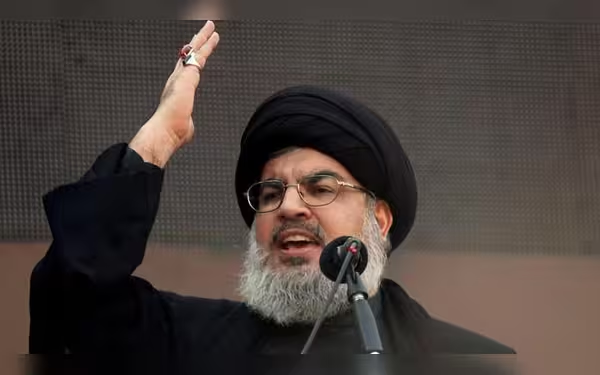Saturday, November 16, 2024 09:31 PM
Assassination of Hezbollah Leader Hassan Nasrallah Sparks Global Condemnation
- Hassan Nasrallah's assassination shocks Middle East politics.
- Iran vows to continue Nasrallah's work despite his death.
- International leaders condemn the act as a dangerous escalation.
 Image Credits: thenews.com.pk
Image Credits: thenews.com.pkThe assassination of Hezbollah leader Hassan Nasrallah has drawn global condemnation and raised concerns over regional stability.
The recent assassination of Hassan Nasrallah, the leader of Hezbollah, has sent shockwaves through the political landscape of the Middle East. Nasrallah was a prominent figure in the region, known for his strong stance against Israel and his leadership of the Shiite militant group. His death raises significant concerns about the future of Hezbollah and the stability of the region, as world leaders react to this shocking event.
The foreign ministry of Iran, a key supporter of Hezbollah, has made it clear that Nasrallah's work will continue despite his death. In a statement, they emphasized that Israel would "bear full responsibility" for the "tragic" consequences that could arise from this assassination. This statement highlights the potential for increased tensions and violence in an already volatile area.
International reactions have been swift, with leaders from various countries condemning the assassination. Many view this act as a dangerous escalation that could lead to further conflict. The assassination not only affects Hezbollah but also has implications for Iran, Syria, and other nations involved in the ongoing struggles in the region.
As the dust settles, it is essential to consider the broader implications of Nasrallah's death. Will Hezbollah remain a formidable force without its leader? How will Iran respond to this act of aggression? These questions linger in the air, as the world watches closely.
The assassination of Hassan Nasrallah marks a pivotal moment in Middle Eastern politics. It serves as a reminder of the fragile nature of peace in the region and the potential for conflict to erupt at any moment. As we reflect on this event, it is crucial to remain informed and aware of the ongoing developments, as they will undoubtedly shape the future of the Middle East.













